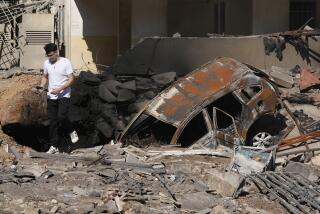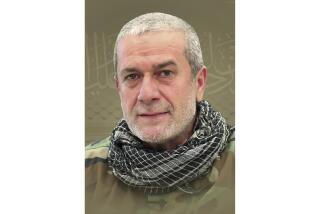Major Taliban figure is killed in airstrike, U.S. military says
- Share via
KABUL, AFGHANISTAN — U.S. forces killed a senior Taliban figure who was also an associate of Osama bin Laden in an airstrike in a remote area of southern Afghanistan, the American military announced Saturday.
Mullah Akhtar Mohammed Osmani would be the highest-ranking Taliban figure killed by U.S. forces in a manhunt that began with the Islamist regime’s fall in December 2001.
The U.S. military described the death of Osmani as a major blow for the Taliban, which has regrouped in recent months after a period of relative inactivity, aided by proceeds from a record-breaking opium crop.
The Taliban denied that Osmani had been killed. Qari Yousaf Ahmadi, who says he is a spokesman for Taliban affairs in southern Afghanistan, acknowledged the deaths of four fighters in the airstrike Tuesday in an isolated area of Helmand province. But he identified the most-senior figure among the dead as Mullah Abdul Zahir, a mid-level field commander.
The U.S. announcement comes in the waning days of a difficult year for coalition forces in Afghanistan. At least 4,000 people have died in a surge of violence that included more than 115 suicide bombings.
The Taliban, ousted by the U.S.-led coalition five years ago, has been working in recent months to sharpen its offensive against about 40,000 North Atlantic Treaty Organization and U.S. troops in the country.
NATO, however, says it has taken the offensive, pursuing the militants to their strongholds, which are mainly clustered near the Pakistani border in the south and east of Afghanistan.
U.S. military officials said that in the four days since the airstrike, they learned the identities of the commander and at least two associates who were traveling in a vehicle with him.
Col. Tom Collins, who informed reporters of Osmani’s death, declined to specify how U.S. forces had confirmed it. Another spokesman, speaking on condition of anonymity, said “various means” were used to determine the commander’s identity. No supporting evidence such as video of the strike was provided, as is sometimes done when a high-profile target is hit.
Collins said that Osmani’s death would impede the militia’s ability to plan attacks. But he also said the coalition expected that the Taliban would “put somebody else in that position.”
“And we’ll go after that person too,” he said.
The Afghan government initially made no independent announcement of Osmani’s death. But a spokesman for the Interior Ministry confirmed it several hours after the announcement.
Collins said Afghan intelligence agencies had helped piece together reports confirming that Osmani was riding in the vehicle that was destroyed in the strike.
Southern Afghanistan, Osmani’s base of operations, has seen an escalating campaign of insurgent attacks including bombings and abductions. The coalition described Osmani as a ringleader, quartermaster and financier of this drive.
Osmani was said to have served as a liaison between the Taliban and Al Qaeda, and to have been close to Bin Laden and Mullah Mohammed Omar, the fugitive Taliban supreme leader.
But U.S. military officials disclosed no details about Osmani’s alleged contacts with those fugitives or with Gulbuddin Hekmatyar, another prominent militant leader.
Osmani was described by Collins as having ranked just below the most senior echelon of Taliban leadership, sharing the senior field command with two other figures, military strategist Mullah Obaidullah and Mullah Dadullah, who is noted for his ferocious tactics.
U.S. military officials declined to say how long they had been tracking Osmani, or whether it appeared he had taken more than occasional refuge in Pakistan. Controversy has been brewing over whether Pakistan, though ostensibly allied with the U.S. in the hunt for Taliban figures, has tried hard enough to prevent Taliban militants from finding sanctuary in Pakistan.
During the Taliban reign, Osmani was a high-level field commander in the region surrounding Kandahar, the home base of the Taliban.
Military officials expressed satisfaction that the strike targeting Osmani was carried out in an isolated area without injuring any bystanders. Civilian casualties during coalition operations have mounted sharply in recent months.
“When the time was right and we thought we had a good chance of hitting [Osmani] without causing any harm to civilians, we struck,” Collins said.
*
Staff writer King reported from Islamabad, and special correspondent Zaman from Kabul.
More to Read
Sign up for Essential California
The most important California stories and recommendations in your inbox every morning.
You may occasionally receive promotional content from the Los Angeles Times.













